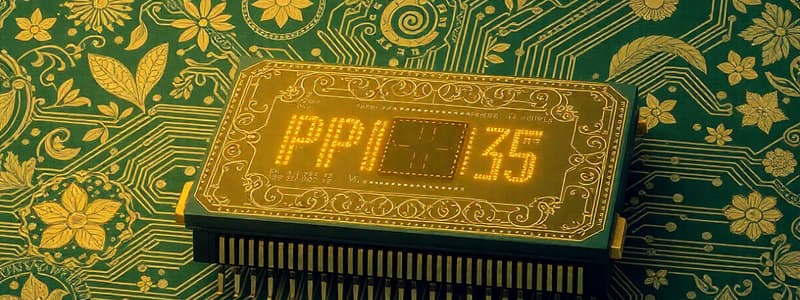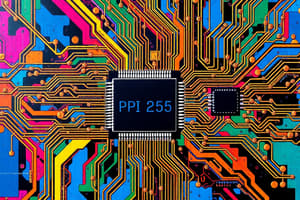Podcast
Questions and Answers
What is the primary purpose of the Programmable Peripheral Interface (PPI) 8255?
What is the primary purpose of the Programmable Peripheral Interface (PPI) 8255?
- To manage memory allocation for the CPU
- To regulate power supply to microprocessors
- To interface the CPU with external devices (correct)
- To provide a direct connection to storage devices
Which ports of the PPI 8255 can be assigned input or output functions?
Which ports of the PPI 8255 can be assigned input or output functions?
- Only PORT A
- PORT A, PORT B, and PORT C (correct)
- Only PORT C
- PORT A and PORT C
In which mode does the PPI 8255 support handshake I/O operations?
In which mode does the PPI 8255 support handshake I/O operations?
- Mode 0
- BSR mode
- Mode 2
- Mode 1 (correct)
What does the Control Register of the PPI 8255 do?
What does the Control Register of the PPI 8255 do?
Which pin mode does Port C operate in when configured for BSR mode?
Which pin mode does Port C operate in when configured for BSR mode?
How many bits are there in each of the I/O ports of the PPI 8255?
How many bits are there in each of the I/O ports of the PPI 8255?
Which component of the PPI 8255 allows for selecting different ports?
Which component of the PPI 8255 allows for selecting different ports?
What happens to the PPI 8255 input-output operations in Mode 0?
What happens to the PPI 8255 input-output operations in Mode 0?
What is the primary function of the 8255 PPI?
What is the primary function of the 8255 PPI?
How many interrupt lines can be achieved by cascading 8259 chips?
How many interrupt lines can be achieved by cascading 8259 chips?
What role does the Data Bus Buffer play in the operation of the 8259?
What role does the Data Bus Buffer play in the operation of the 8259?
Which feature of the 8259 allows for the masking of individual interrupt requests?
Which feature of the 8259 allows for the masking of individual interrupt requests?
What is the maximum amount of data the Data Bus Buffer of the 8259 can send at one time?
What is the maximum amount of data the Data Bus Buffer of the 8259 can send at one time?
What additional feature does 8251 USART provide for communication?
What additional feature does 8251 USART provide for communication?
In the context of the 8251 USART, what does TXRDY signify?
In the context of the 8251 USART, what does TXRDY signify?
What type of communication does 8251 USART facilitate?
What type of communication does 8251 USART facilitate?
What is a primary disadvantage of the 8255 PPI?
What is a primary disadvantage of the 8255 PPI?
Which component controls the overall working of the 8251?
Which component controls the overall working of the 8251?
What is the function of the Priority Resolver in the 8259?
What is the function of the Priority Resolver in the 8259?
What signals are controlled by the RTS pin in the modem control block of the 8251?
What signals are controlled by the RTS pin in the modem control block of the 8251?
How is the 8251 USART primarily utilized?
How is the 8251 USART primarily utilized?
What does the Interrupt Request Register in the 8259 serve to do?
What does the Interrupt Request Register in the 8259 serve to do?
What is the maximum data transfer rate of the 8251 USART?
What is the maximum data transfer rate of the 8251 USART?
Which of the following is a disadvantage of the 8251 USART?
Which of the following is a disadvantage of the 8251 USART?
What technology is used in the 8253 chip?
What technology is used in the 8253 chip?
Which command is unique to the 8254 compared to the 8253?
Which command is unique to the 8254 compared to the 8253?
How many independent 16-bit counters does the 8253/54 have?
How many independent 16-bit counters does the 8253/54 have?
Which signal is NOT used in the Read/Write logic of the 8253/54?
Which signal is NOT used in the Read/Write logic of the 8253/54?
What is the main function of the data bus buffer in the 8253/54 architecture?
What is the main function of the data bus buffer in the 8253/54 architecture?
In the 8253/54 architecture, what does the 'OUT' pin signify?
In the 8253/54 architecture, what does the 'OUT' pin signify?
What is the operating frequency range of the 8254?
What is the operating frequency range of the 8254?
Which of the following is a limitation of the 8251 USART regarding memory access?
Which of the following is a limitation of the 8251 USART regarding memory access?
Which mode of the PPI 8255 allows only port A to operate?
Which mode of the PPI 8255 allows only port A to operate?
What is the primary purpose of port C in PPI 8255?
What is the primary purpose of port C in PPI 8255?
What happens when the most significant bit of the control word is set to 0?
What happens when the most significant bit of the control word is set to 0?
Which of the following is NOT a disadvantage of the PPI 8255?
Which of the following is NOT a disadvantage of the PPI 8255?
What advantage does the PPI 8255 provide concerning system performance?
What advantage does the PPI 8255 provide concerning system performance?
How many bits does each port of the PPI 8255 provide?
How many bits does each port of the PPI 8255 provide?
In which mode does the PPI 8255 not support interrupt handling capabilities?
In which mode does the PPI 8255 not support interrupt handling capabilities?
Which of the following is a common application of the PPI 8255?
Which of the following is a common application of the PPI 8255?
What is one of the benefits of the PPI 8255's programmability?
What is one of the benefits of the PPI 8255's programmability?
What is the primary limitation of the PPI 8255 in terms of I/O capabilities?
What is the primary limitation of the PPI 8255 in terms of I/O capabilities?
Which of the following characteristics relates to the PPI 8255 regarding its operational modes?
Which of the following characteristics relates to the PPI 8255 regarding its operational modes?
Which port configuration allows for the highest efficiency in data transfer?
Which port configuration allows for the highest efficiency in data transfer?
What is a characteristic of the control register in the 8255?
What is a characteristic of the control register in the 8255?
Which component does the PPI 8255 primarily interface with for I/O operations?
Which component does the PPI 8255 primarily interface with for I/O operations?
Which mode of the PPI 8255 restricts the operation to simple input or output functions without any interrupt handling?
Which mode of the PPI 8255 restricts the operation to simple input or output functions without any interrupt handling?
What is the function of port C in the PPI 8255 when configured to operate in BSR mode?
What is the function of port C in the PPI 8255 when configured to operate in BSR mode?
What is the maximum number of bits that can be configured in port C of the PPI 8255?
What is the maximum number of bits that can be configured in port C of the PPI 8255?
Which control word setting indicates that the PPI 8255 should operate in input-output mode?
Which control word setting indicates that the PPI 8255 should operate in input-output mode?
Which of the following pins is NOT used in the operation of the PPI 8255?
Which of the following pins is NOT used in the operation of the PPI 8255?
In which mode does Port B of the PPI 8255 operate when it is configured for input-output functions?
In which mode does Port B of the PPI 8255 operate when it is configured for input-output functions?
What happens to the PPI 8255 when the most significant bit of the control word is set to 0?
What happens to the PPI 8255 when the most significant bit of the control word is set to 0?
Which address is assigned to the control register of the PPI 8255?
Which address is assigned to the control register of the PPI 8255?
Which disadvantage is associated with the 8251 USART regarding its data transmission capabilities?
Which disadvantage is associated with the 8251 USART regarding its data transmission capabilities?
What is the operating frequency range for the 8253 chip?
What is the operating frequency range for the 8253 chip?
Which feature is unique to the 8254 compared to the 8253?
Which feature is unique to the 8254 compared to the 8253?
Which aspect of the 8251 USART contributes to its complexity in programming?
Which aspect of the 8251 USART contributes to its complexity in programming?
What is one of the capabilities of the data bus buffer in the 8253/54 architecture?
What is one of the capabilities of the data bus buffer in the 8253/54 architecture?
What advantage does the 8254 have over the 8253 regarding counter operations?
What advantage does the 8254 have over the 8253 regarding counter operations?
Which of these features makes the 8251 USART particularly suitable for various systems?
Which of these features makes the 8251 USART particularly suitable for various systems?
How many independent 16-bit down counters do the 8253 and 8254 provide?
How many independent 16-bit down counters do the 8253 and 8254 provide?
What is a primary limitation of the 8251 USART regarding data transfer speed?
What is a primary limitation of the 8251 USART regarding data transfer speed?
What type of technology is utilized in the 8253?
What type of technology is utilized in the 8253?
What is a key feature of the 8259 Programmable Interrupt Controller?
What is a key feature of the 8259 Programmable Interrupt Controller?
Which block in the 8259 is responsible for storing currently executing interrupt levels?
Which block in the 8259 is responsible for storing currently executing interrupt levels?
What process does the 8251 USART perform when receiving data?
What process does the 8251 USART perform when receiving data?
Which register in the 8259 allows for the individual masking of interrupt requests?
Which register in the 8259 allows for the individual masking of interrupt requests?
What characteristic of the Priority Resolver in the 8259 determines which interrupts are processed first?
What characteristic of the Priority Resolver in the 8259 determines which interrupts are processed first?
Which component in the 8251 USART controls the overall functioning of the device?
Which component in the 8251 USART controls the overall functioning of the device?
What type of signals does the RTS pin in the modem control block of the 8251 represent?
What type of signals does the RTS pin in the modem control block of the 8251 represent?
What is one significant limitation of the 8255 PPI regarding peripheral interface?
What is one significant limitation of the 8255 PPI regarding peripheral interface?
In cascading 8259 chips, what advantage does this provide?
In cascading 8259 chips, what advantage does this provide?
Which of the following roles is performed by the Transmit Buffer in the 8251 USART?
Which of the following roles is performed by the Transmit Buffer in the 8251 USART?
What is a notable advantage of the 8251 USART?
What is a notable advantage of the 8251 USART?
What is the primary function of Data Bus Buffer in the 8259?
What is the primary function of Data Bus Buffer in the 8259?
Which operation does the 8251 USART NOT perform in its data handling capabilities?
Which operation does the 8251 USART NOT perform in its data handling capabilities?
What function does the Control Logic in the 8259 serve?
What function does the Control Logic in the 8259 serve?
What is the primary function of port C in the PPI 8255?
What is the primary function of port C in the PPI 8255?
In I/O mode, what is the capability provided by mode 1 of the PPI 8255?
In I/O mode, what is the capability provided by mode 1 of the PPI 8255?
What determines the operational mode of the PPI 8255?
What determines the operational mode of the PPI 8255?
Which mode of the PPI 8255 allows for only port A to operate effectively?
Which mode of the PPI 8255 allows for only port A to operate effectively?
What is one major disadvantage of using the PPI 8255?
What is one major disadvantage of using the PPI 8255?
What is essential to successfully communicate with peripherals using the PPI 8255?
What is essential to successfully communicate with peripherals using the PPI 8255?
What is a key advantage of the PPI 8255 regarding its cost?
What is a key advantage of the PPI 8255 regarding its cost?
How does the PPI 8255 improve system performance?
How does the PPI 8255 improve system performance?
In which mode does the PPI 8255 lack interrupt handling capabilities?
In which mode does the PPI 8255 lack interrupt handling capabilities?
Which of the following accurately describes the complexity of using the PPI 8255?
Which of the following accurately describes the complexity of using the PPI 8255?
Which applications are commonly associated with the PPI 8255?
Which applications are commonly associated with the PPI 8255?
What characterizes the versatility of the PPI 8255?
What characterizes the versatility of the PPI 8255?
What limitation affects the PPI 8255's resolution?
What limitation affects the PPI 8255's resolution?
Study Notes
Programmable Peripheral Interface PPI (8255)
- The 8255 is a general-purpose programmable I/O device used to interface a CPU with external devices like ADCs, DACs, and keyboards.
- It consists of three 8-bit bidirectional I/O ports: Port A, Port B, and Port C.
- Each port can be programmed to function as input or output.
- Port C can be further divided into two 4-bit ports, Port C Lower and Port C Upper.
- Port C can operate in either BSR (Bit Set Reset) mode or input/output mode.
- The 8255 has two control groups: Control Group A (Port A and Port C Upper) and Control Group B (Port C Lower and Port B).
- Different ports can be selected for different modes by writing a control word to the control register based on the values of CS', A1, and A0.
- The 8255 operates in two modes: BSR mode and input/output mode.
BSR Mode
- The 8255 works in BSR mode when the most significant bit (D7) of the control word is 0.
- Only Port C bits are used to set or reset specific bits.
Input/Output Mode
- The 8255 works in input/output mode when D7 is 1.
- This mode has three sub-modes: Mode 0, Mode 1, and Mode 2.
Mode 0
- All three ports (Port A, Port B, and Port C) can be configured as either simple input or simple output.
- No interrupt handling capabilities are available in this mode.
Mode 1
- Either Port A or Port B can be configured as input or output.
- Port C bits are used as handshake signals for synchronized data transmission.
- Interrupt handling capabilities are available in this mode.
Mode 2
- Only Port A functions as a bi-directional data bus.
- Port B can be configured in either Mode 0 or Mode 1.
- 6 bits of Port C are used as handshake signals.
- Interrupt handling capabilities are available in this mode.
Programmable Interrupt Controller PIC (8259)
- The 8259 is a Programmable Interrupt Controller (PIC) used to increase the interrupt-handling capabilities of a microprocessor.
- It combines multiple interrupt input sources into a single interrupt output.
- It provides 8 interrupt lines, IR0 to IR7.
- It can be programmed for either edge-triggered or level-triggered mode.
- Individual interrupt request register bits can be masked to selectively disable certain interrupt requests.
- Cascading multiple 8259 chips allows for up to 64 interrupt lines.
- The 8259 has various blocks: Data bus buffer, R/W Control Logic, Control Logic, Interrupt Request Register, Interrupt Service Register, Interrupt Mask Register, Priority Resolver, and Cascade Buffer.
Universal Synchronous Asynchronous Receiver Transmitter USART (8251)
- The 8251 USART (Universal Synchronous Asynchronous Receiver Transmitter) acts as a mediator between a microprocessor and peripherals for serial data transmission.
- It converts serial data from peripherals into parallel data for the CPU.
- It also converts parallel data from the CPU into serial data for peripherals.
- It consists of blocks: Data bus buffer, Read/Write control logic, Modem control, Transmit buffer, Transmit control, Receive buffer, and Receive control.
Programmable Interval Timer PIT (8253)
- The 8253 and 8254 are programmable interval timers (PITs) used for timing and counting functions.
- They have three independent 16-bit down counters, each with two input pins (Clock & Gate) and one output pin (OUT).
- When a 16-bit count is loaded into a counter, it decrements the count until it reaches 0 and then generates a pulse that can be used to interrupt the CPU.
- They support both binary and BCD counting modes.
- They are compatible with various microprocessors.
- The 8254 includes a Read Back command to check count values, programmed mode, current mode, and counter status.
- It features a data bus buffer, Read/Write control logic, and a control word register.
- Each of the three counters has a dedicated control word to configure its operation.
Programmable Interfacing Devices
- Programmable interfacing devices are integrated circuits designed to interface a CPU with peripheral devices, facilitating communication and control.
- They are often programmable, allowing customization for specific applications.
Programmable Peripheral Interface (PPI) 8255
- This device is a general-purpose programmable I/O IC designed to interface the CPU with external devices like ADCs, DACs, and keyboards.
- It has three 8-bit bidirectional I/O ports: Port A, Port B, and Port C, each configurable as input or output.
- Port C can be divided into two 4-bit ports for specialized functions.
Operating Modes
- Bit Set Reset (BSR) Mode: Port C bits are used for setting or resetting individual bits.
- Input-Output Mode: Ports can be configured for various input/output functions, divided into three modes:
- Mode 0: All ports work as simple input or output, with no interrupt handling.
- Mode 1: Handshake I/O, allowing synchronized data transfer with peripherals using handshake signals.
- Mode 2: Bidirectional data bus, with Port A operating in bidirectional mode and Port B using Mode 0 or Mode 1.
Programming
- The 8255 is programmed by writing control words to a control register, determining the operational mode and port configuration.
- The control word has 8 bits, with the most significant bit (D7) indicating the operating mode (0 for BSR, 1 for I/O).
Programmable Interrupt Controller (PIC) 8259
- An IC designed to expand the interrupt handling capabilities of a microprocessor.
- It combines multiple interrupt sources into a single interrupt output, allowing for more efficient interrupt management.
- It provides eight interrupt request lines (IR0 to IR7) and can be programmed for edge or level-triggered operation.
Features
- Can mask individual interrupt request lines, selectively disabling interruptions.
- Can be cascaded to increase interrupt handling capacity to 64 interrupt lines.
- Does not require a clock cycle for operation.
Universal Synchronous Asynchronous Receiver Transmitter (USART) 8251
- An IC used to convert serial data to parallel format and vice versa, facilitating communication between the CPU and peripherals.
- It receives serial data from peripherals and converts it to parallel data for the CPU.
- It also receives parallel data from the CPU and converts it to serial data for peripherals.
- It contains various blocks dedicated to data buffering, control logic, and serial-to-parallel/parallel-to-serial conversion.
Features
- Can be programmed for both synchronous and asynchronous communication, supported by dedicated modem control pins.
- Includes error detection capabilities and flow control mechanisms to ensure accurate data transfer.
Programmable Interval Timer (PIT) 8253/54
- An IC designed to perform timing and counting functions using three 16-bit down-counters.
- Each counter has two input pins (CLOCK & GATE) and one output pin (OUT).
- Counters are programmed to decrement from a loaded count value, generating a pulse upon reaching zero.
Features
- Can handle input frequencies up to 10 MHz.
- Can be programmed for binary or BCD counting.
- 8254 provides a "Read-Back" command to allow users to examine counter states and settings.
Architecture
- It includes three independent counter blocks, a data bus buffer, Read/Write control logic, and a control register.
- The control register is programmed with a control word to determine the counter operation modes and settings.
Studying That Suits You
Use AI to generate personalized quizzes and flashcards to suit your learning preferences.
Description
Test your knowledge on the 8255 programmable peripheral interface, a crucial device for CPU and external device interaction. This quiz covers its structure, operational modes, and control mechanisms, ensuring a comprehensive understanding of its functionality.





